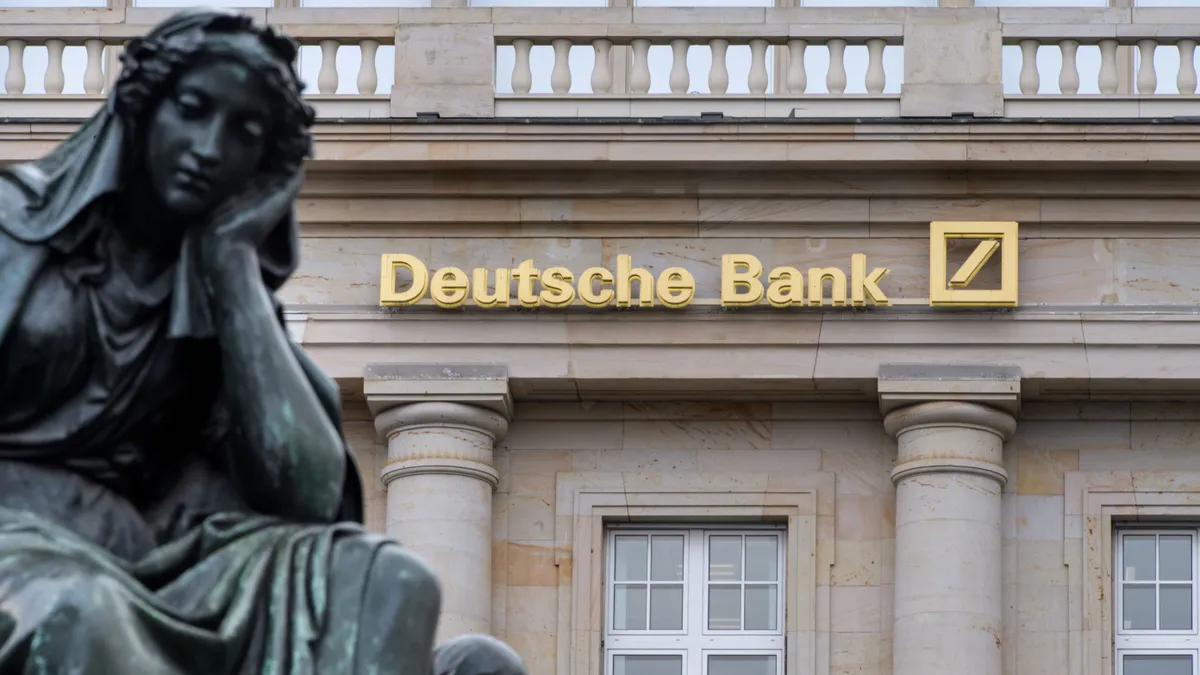Dive Brief:
-
Crediting renewed success in its investment banking unit, Deutsche Bank AG, Germany’s largest lender, had its best quarterly earnings in seven years, with a pre-tax profit of €1.6 billion, or $1.94 billion.
-
“It was a very successful quarter across the board for the company,” CFO James von Moltke told Bloomberg. “We’ve been in the process of strengthening the franchise, quarter after quarter, and getting better and better client engagement.”
-
The strong quarter doesn’t represent a change in the bank’s strategy, von Moltke said, but rather “strong execution of [its existing] strategy and favorable market conditions.”
Dive Insight:
Both the investment bank and asset management units saw a 23% year-over-year revenue growth, which led the bank's improved performance, von Moltke told CNBC.
“It is too early to comment on the likely impact of our recent performance and the uncontrollable items on 2022, but we remain committed to our strategic and financial targets and ambitions for 2022,” he said. “We have been and will be diligent on risk management, and we'll continue to manage the balance sheet conservatively.”
The bank’s success comes amid a mass business restructuring it has been undertaking since 2019, “the cost of which had weighed on earnings alongside elevated credit provisions.” CNBC said. Even so, the bank returned to profitability last year, reporting a full-year net profit of over $137 million.
Looking past the pandemic, van Moltke said the bank is aiming for flexibility in how much employees will have to work on-site once offices fully reopen. The company maintains branches in 58 countries.
“It's very hard to say, because it's so location specific,” he told Bloomberg. “We've set rules for ourselves in terms of both what the government’s instructions were and the comfort that we have with our employees. And we're going to execute on those rules over time.”
With the vaccine rollout continuing, the bank sees office reopenings on the horizon. “We expect, in some important locations like London and New York, for that to start over the next several months,” he said.
The bank has announced to its employees that it will be providing additional flexibility going forward, including a hybrid working model, up to this point a rarity in the banking profession.
“We learned some really positive lessons from how we were able to operate in the pandemic,” van Moltke said. “We're in the process of finalizing those plans and articulating them to our employees: how many days really allow them to work remotely.”
Van Moltke offered a range of working from home: 40-60% of the time. “It'll really be up to the employee, but in a structured way, with the manager,” he said, adding that the bank’s aim is to know when people are expected to come into work and when remote work is feasible.
“We're pleased with the way we've been able to formulate that process,” he said.
In November, the bank shared tentative plans to reduce its office space. It was even considering letting staff permanently work from home for two days a week, according to Insider.














